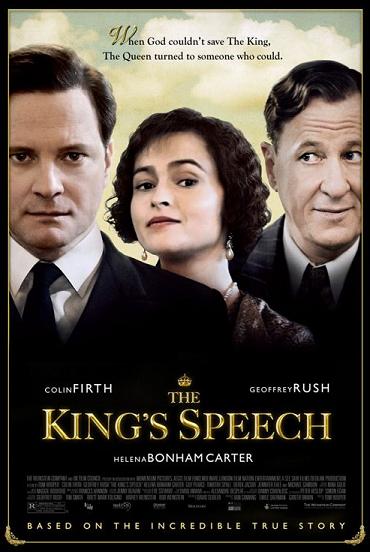
Among tried-and-true formulas for an effective, Oscar-candidate movie, the most reliable often concern either the activities of an ordinary person facing extraordinary circumstances or those of an extraordinary person challenged by the ordinary. Like The Queen before it, The King's Speech, a stately, carefully crafted specimen of a satisfying formula movie well positioned for the awards attention being heaped upon it, opts for the second variation and grounds the emotional drama in historical fact. In a performance of nuance and soul that would be more astonishing only if we hadn't become almost spoiled by expecting such quality from him, Colin Firth plays Prince Albert, who suddenly became Great Britain's King George VI when his older brother, King Edward VIII, abdicated the throne in 1936. King George was royalty, true. But he was also a private man whom his family called Bertie — and Bertie had a debilitating speech impediment that tormented him for much of his life. Even a king can have a common stutter, this sturdy backstairs-at-the-palace drama assures. Even a king could do with some trusted help. Even a king must find his own voice.
In this monarch's case, unlikely help arrived in the person of Lionel Logue (Geoffrey Rush), a highly unorthodox, self-taught Australian speech therapist who ended up as much in the role of an informal shrink as that of an unlicensed pathologist. The king's resourceful wife, Elizabeth (Helena Bonham Carter) — the future Queen Mother — found Logue and introduced the two. And at least as dramatized history would have it, the relationship got off to a rocky start. Firth is front and center in this intelligent crowd-pleaser, and he endows Albert-turned-George with a poignant dignity even while exposing his past as a lonely little boy who grew up stammering in the shadow of his imperious father and dashing brother. But Firth's triumph is seamlessly linked to his generous give-and-take with Rush (agile and expressive as ever) and Bonham Carter (a gentle ball of fire). The trio is grounded in turn by the well-written (if sometimes stagy) screenplay of David Seidler, a journeyman TV writer now 73 years old, who was himself a childhood stutterer. And as directed by Tom Hooper (who presided over HBO's Emmy-winning series John Adams), The King's Speech is simultaneously cozy and majestic.
It's also, truth to tell, a little square. The title carries a double meaning: The king's speech itself is trapped inside the stuttering man and needs coaxing by Logue to emerge. And also, the movie climaxes with the fateful speech King George made to his subjects, rallying them on the eve of World War II. Lest the audience miss a cue, Hooper and soundtrack composer Alexandre Desplat count on the ringing grandeur of Beethoven's Seventh Symphony — the famous second movement, no less — to amp the emotions. With instincts like these, Oscar speeches are bound to follow.
























No comments:
Post a Comment